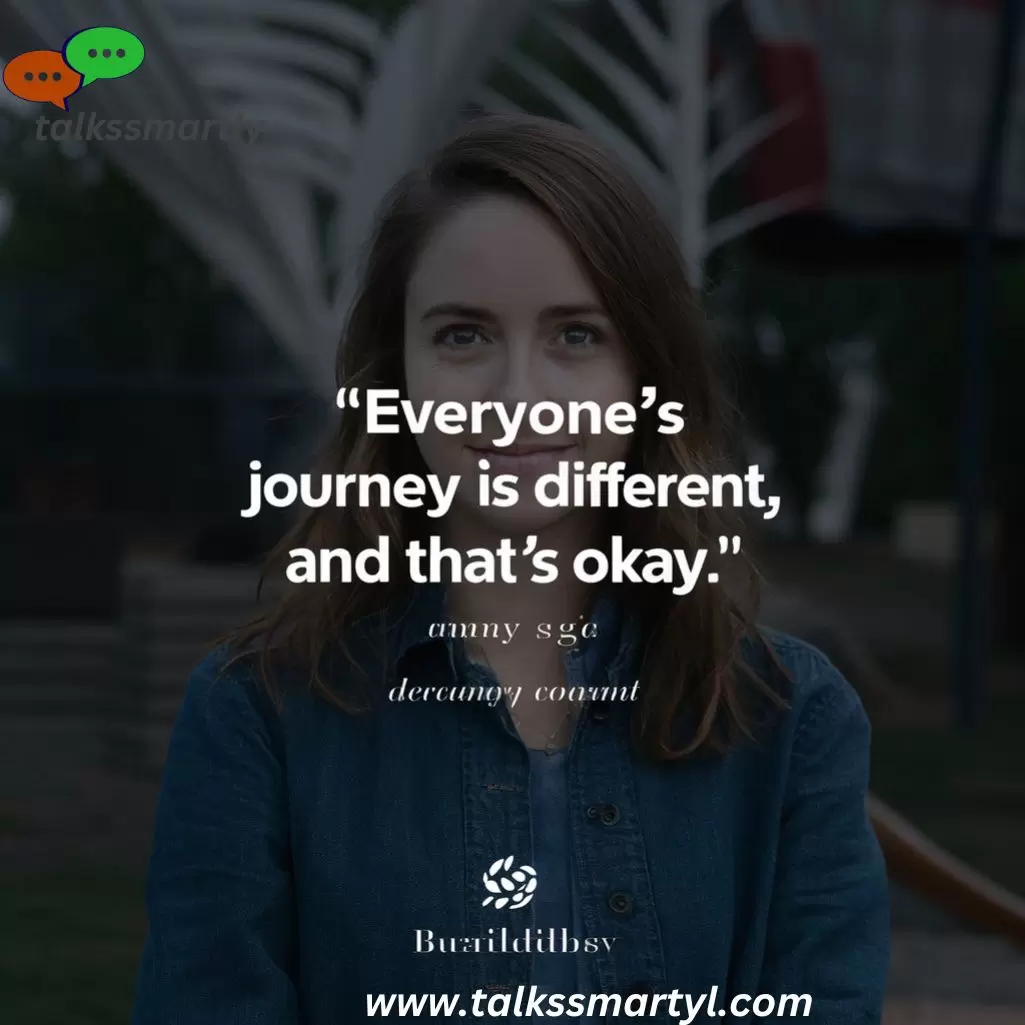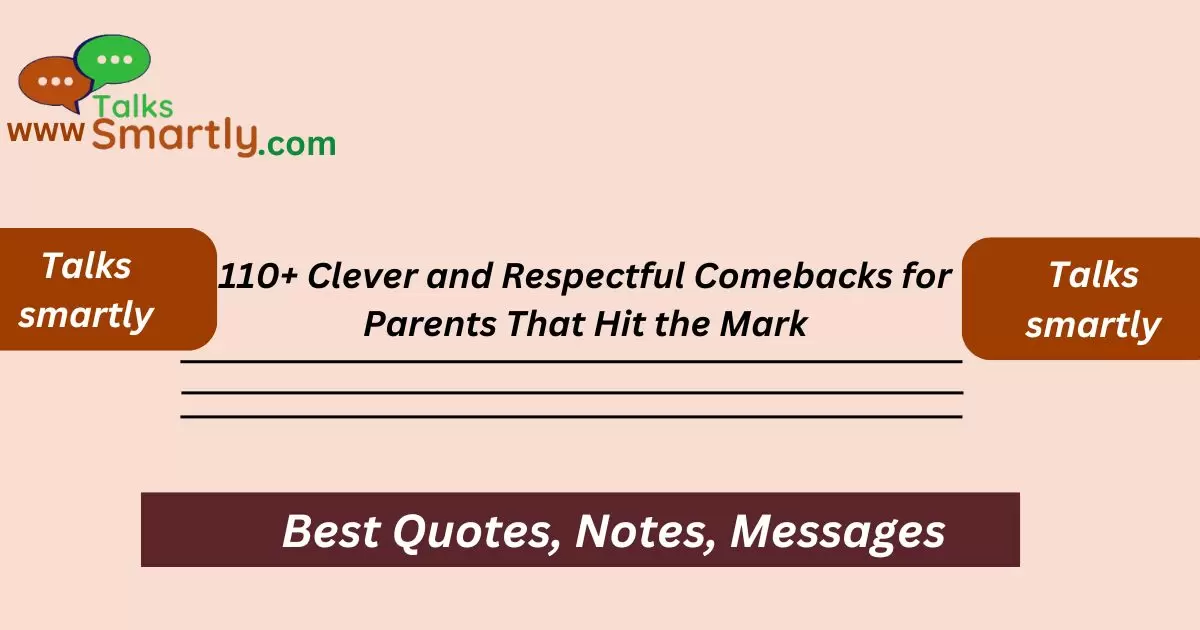“Struggling to find the right words with your parents? This guide offers over 110 clever and respectful comebacks to help you navigate conversations with confidence and grace.”
Feeling stuck in a loop of arguments with your parents? Finding the right words can turn a heated discussion into a productive conversation. This article offers clever and respectful comebacks to help you navigate those tricky moments with grace and wit.
In the following sections, we’ll explore over 110 clever responses that will not only help you make your point but also maintain respect. Whether you’re dealing with common misunderstandings or more complex issues, these comebacks will give you a fresh perspective and effective communication strategies.
We’ve categorized the comebacks into various scenarios to make it easier for you to find exactly what you need. Each category contains unique and thoughtful responses to help you handle different situations with confidence.
Handling Overly Critical Comments
- “I appreciate your concern, but I have my own way of handling things.”
- “Everyone has a different approach; mine just works for me.”
- “Thanks for the input. I’ll consider it, but I’m confident in my plan.”
- “I understand you’re trying to help, but I’ve got this covered.”
- “Your feedback is noted. I’ll take it into account.”
- “I’m learning from my own experiences, which is important to me.”
- “I value your opinion, but I need to follow my own path.”
- “It’s great you’re invested, but I’m comfortable with my choices.”
- “I know you mean well, but I need to make my own decisions.”
- “We might have different perspectives, and that’s okay.”
- “I appreciate your advice, but I’ll handle it in my own way.”
- “Your support is important, but I’m figuring this out on my own.”
- “I’m sure we’ll both learn from this, in our own ways.”
- “Let’s agree to disagree on this one.”
Responding to Unwanted Advice
- “I appreciate your advice, but I’m set on doing it this way.”
- “Thanks for the suggestion, but I’ve already made my decision.”
- “I’ve considered all options and am confident in my choice.”
- “I understand where you’re coming from, but I’ve got my plan.”
- “Your perspective is valuable, but I need to try this my way.”
- “I’m following a path that feels right for me.”
- “I’ve done my research and am comfortable with my approach.”
- “I’m going to stick with my decision, thanks for understanding.”
- “I value your input, but I’m committed to this course of action.”
- “Your advice is noted; I’ll handle it as planned.”
- “I appreciate the thought, but this is my choice to make.”
- “I have a different plan that I’m going to follow.”
- “Thanks for the tip, but I’m confident in my own strategy.”
- “I’m moving forward with what I believe is best.”
Dealing with Comparisons
- “I’m unique in my own way, and that’s something to celebrate.”
- “We all have different strengths and qualities that make us special.”
- “I appreciate the comparison, but I’m focusing on my own growth.”
- “It’s great to have role models, but I need to follow my own path.”
- “I’m working on becoming the best version of myself.”
- “I respect their achievements, but I’m building my own success.”
- “Comparisons don’t help me grow; I’m focused on my personal goals.”
- “Everyone’s journey is different, and that’s okay.”

- “I’m proud of my own progress and achievements.”
- “Let’s celebrate each person’s unique contributions.”
- “It’s more productive to support each other than compare.”
- “I’m working towards my own goals, not living up to someone else’s.”
- “I appreciate the encouragement, but I need to be true to myself.”
- “I’m on my own journey, and that’s what matters.”
Handling Financial Discussions
- “I’m managing my finances in a way that works for me.”
- “Budgeting is personal, and I have a plan that fits my needs.”
- “I’m learning to manage my money, and I’m making progress.”
- “Thanks for the advice, but I’ve got a system in place.”
- “Financial decisions are personal, and I’m handling mine carefully.”
- “I appreciate your concern, but I’m comfortable with my finances.”
- “I’m working on my financial goals and learning as I go.”
- “Your advice is valuable, but I’m following my own financial plan.”
- “I’m building my own financial habits and strategies.”
- “Money management is a personal journey, and I’m on my path.”
- “I’m taking control of my finances in a way that suits me.”
- “I have a plan for my money, and I’m sticking to it.”
- “Financial advice is appreciated, but I’m handling things my way.”
- “I’m focused on my financial goals and progress.”
Addressing Personal Choices
- “I’m making choices that align with my values and goals.”
- “My decisions reflect what’s important to me at this time.”
- “I appreciate your concern, but my choices are based on my priorities.”
- “Everyone has their own way of making decisions, and this is mine.”
- “My choices are guided by what I believe is best for me.”
- “I’m following a path that feels right to me.”
- “I value your input, but I need to make decisions for myself.”
- “My personal choices are based on my own experiences and goals.”
- “I’m comfortable with the decisions I’m making.”
- “Personal choices are personal, and I’m sticking with mine.”
- “I’ve thought about my decisions carefully and stand by them.”
- “It’s important for me to follow my own instincts and values.”
- “I’m making choices that align with my vision for my life.”
- “Thanks for understanding that these are my personal decisions.”
Hilarious Texts Will Make You Laugh (Not Cry)
Responding to Repeated Questions
- “I’ve answered this before, but I’m happy to clarify again.”
- “I understand your curiosity, but my answer hasn’t changed.”
- “I’ve explained my stance on this topic already.”
- “I appreciate your interest, but my response remains the same.”
- “I’ve given this matter some thought and my answer is consistent.”
- “I’m sticking with my previous response on this issue.”
- “My position hasn’t changed, but I’m open to discussing other topics.”
- “I’ve addressed this question before and am sticking with my answer.”
- “I’m clear on my stance, and it hasn’t changed.”
- “I’ve provided my response previously and am consistent with it.”
- “I’ve covered this topic already, but I’m happy to move on.”
- “I’ve answered this question before; is there anything else I can help with?”
- “I’m firm on my answer, and we can discuss other subjects if you’d like.”
- “I appreciate the follow-up, but my response is unchanged.”
Handling Time Management Discussions
- “I’m organizing my time in a way that works best for me.”
- “Everyone has their own schedule, and mine fits my needs.”
- “I appreciate your suggestions, but I have a plan that suits me.”
- “Managing time is personal, and I’m following my own approach.”
- “I’ve created a schedule that helps me stay on track.”
- “Time management is about finding what works for me.”
- “I’m confident in how I’m allocating my time.”
- “Thanks for the advice, but I’m managing my time effectively.”
- “I have a system in place that helps me stay organized.”
- “My schedule is tailored to my personal needs and goals.”
- “I’m following a time management strategy that fits my lifestyle.”
- “I appreciate the input, but my time management plan is working well.”
- “I’m handling my time in a way that aligns with my priorities.”
- “My approach to time management is working for me.”
Addressing Academic or Career Choices
- “I’m pursuing a path that aligns with my passions and skills.”
- “My academic and career choices reflect my personal interests and goals.”
- “I appreciate your perspective, but I’m following my own career path.”
- “I’m making decisions based on what I enjoy and where I see myself.”
- “My career choices are based on my strengths and aspirations.”
- “I’m confident in the direction I’m heading with my studies.”
- “My path is guided by what I’m passionate about.”
- “Thanks for your concern, but I’m focused on my own goals.”
- “I’m working towards a career that suits my talents and interests.”
- “My academic choices are driven by what I want to achieve.”
- “I value your advice, but I’m pursuing a path that feels right for me.”
- “I’m following a career plan that aligns with my long-term vision.”
- “My academic and career decisions are tailored to my personal goals.”
- “I’m comfortable with the direction I’m taking.”
Dealing with Lifestyle Choices
- “My lifestyle choices reflect what makes me happy and healthy.”
- “I appreciate your concern, but I’m living in a way that suits me.”
- “Everyone has different preferences, and this is what works for me.”
- “My lifestyle reflects my personal values and interests.”
- “I’m making choices that align with my own well-being.”
- “My daily habits are designed to support my happiness and health.”
- “Thanks for your input, but I’m comfortable with my lifestyle.”
- “I’ve chosen a lifestyle that fits my needs and goals.”
- “I’m following a path that aligns with my personal preferences.”
- “My lifestyle choices are based on what makes me feel fulfilled.”
- “I’m confident in the way I’m living and the choices I’m making.”
- “Everyone’s lifestyle is different, and this is mine.”
- “I appreciate the concern, but I’m happy with how I’m living.”
- “My lifestyle reflects my personal choices and priorities.”
Handling Relationship Advice
- “I’m navigating my relationship in a way that feels right to me.”
- “Every relationship is unique, and this is how I’m handling mine.”
- “I appreciate your advice, but I’m following my own instincts.”
- “My relationship decisions are based on what works for us.”
- “I’m focused on building a healthy and happy relationship.”
- “Thanks for the input, but I’m comfortable with our approach.”
- “Every couple has their own dynamic, and this is ours.”
- “I value your perspective, but I’m making decisions based on our needs.”
- “I’m handling my relationship in a way that suits both of us.”

- “Your advice is appreciated, but I’m confident in our choices.”
- “We’re working through things in a way that’s right for us.”
- “I’m following our own plan for a successful relationship.”
- “I understand your concern, but we’re managing things our way.”
- “Our relationship is personal, and we’re comfortable with our approach.”
Responding to Future Plans
- “I have a vision for my future that I’m excited about.”
- “My plans reflect my aspirations and long-term goals.”
- “I appreciate your interest, but I’m focused on my own future.”
- “I’m working towards goals that are important to me.”
- “My future plans are based on what I want to achieve.”
- “Thanks for your curiosity, but I’m following my own path.”
- “I’m excited about my future and the steps I’m taking.”
- “My plans are aligned with my personal ambitions.”
- “I’m confident in the direction I’m heading.”
- “My future plans are tailored to my dreams and aspirations.”
- “I’m focused on achieving my goals and building my future.”
- “I appreciate your concern, but I’m comfortable with my plans.”
- “My vision for the future is guided by my own values and goals.”
- “I’m working towards a future that I’m excited about.”
Handling Emotional Support
- “I’m handling my emotions in a way that works for me.”
- “Everyone deals with emotions differently, and this is my approach.”
- “I appreciate your concern, but I have my own way of coping.”
- “My emotional well-being is important to me, and I’m managing it.”
- “I’ve found strategies that help me navigate my feelings.”
- “Thanks for the support, but I’m following my own path to emotional health.”
- “I’m confident in how I’m dealing with my emotions.”
- “My approach to handling emotions is personal and effective for me.”
- “I’m working on my emotional well-being in a way that suits me.”
- “I value your input, but I’m comfortable with my methods.”
- “I’m using techniques that I’ve found helpful for myself.”
- “Everyone’s emotional journey is unique, and this is mine.”
- “I’m managing my feelings in a way that aligns with my needs.”
- “Thanks for understanding that I’m handling my emotions my way.”
Answer to Key Questions:
1. What if my parents don’t understand my point of view?
If your parents don’t understand your perspective, try explaining your viewpoint clearly and calmly. Use examples and be patient in your explanations.
2. How can I stay respectful while using these comebacks?
Focus on expressing your thoughts without belittling or dismissing your parents’ opinions. Use polite language and stay calm during the conversation.
3. What if a comeback makes the situation worse?
If a comeback escalates the situation, apologize and try to address the issue with a more open and understanding approach. It’s important to maintain respect and avoid further conflict.
4. How can I practice these comebacks effectively?
You can practice by role-playing with a friend or family member. This will help you become more comfortable and confident in using the comebacks in real situations.
5. Are there any comebacks to avoid?
Avoid comebacks that are overly sarcastic or disrespectful. The goal is to communicate effectively, not to hurt or alienate your parents.
Conclusion
Finding the right words to communicate with your parents can be challenging, but using clever and respectful comebacks can make a difference. The key is to express yourself clearly while maintaining respect for their viewpoints.
With these comebacks, you can handle various situations more effectively and keep conversations constructive. Remember, the goal is not only to get your point across but also to foster understanding and maintain healthy relationships.
By using these strategies, you’ll be better equipped to navigate tricky conversations and build stronger, more respectful dialogues with your parents.












